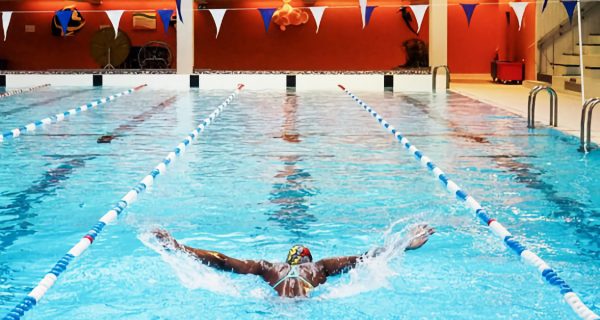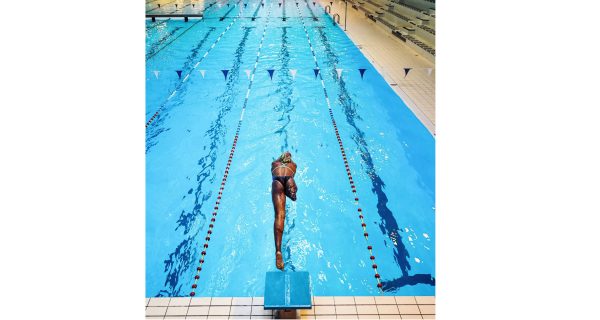« It’s well-known, black people can’t swim” could be read on posters in Paris metro stations in 2016. This campaign to raise awareness about discrimination in sports stems from the misconception that black people swim cannot swim as well as white people. In 1971, the “scientists” Ghesquiere and Karvonien stated that the Caucasian race floats better that the black race, or that the navel being located higher in some would allow them to swim better. These arguments misjudge the ability of black people to swim.
“How do you swim with one leg?” I have to reply to this question regularly and I don’t have the answer. What am I supposed to say?
My name is Nicaise Mokabo. I was seven years old when I lost my leg after a traffic accident. Very quickly, I had to deal with the situation and my prosthetist told me that I had to find a physical activity.
She told me about swimming because it engages all parts of the body. My aunt, who swam all her teenage years, encouraged me to face people’s eyes so that I could free myself from their perceptions. The first time I went to the pool, my mother acted like a lioness protecting her cub: she didn’t want me to go. Everyone was looking at me but when I put my foot in the water, nothing mattered, I didn’t think about the disability and the others, I felt light and free. It was just the water and me.
Since that day, I haven’t left the pool. The coach who taught me to swim wasn’t a person with disabilities, he didn’t know anything about it. He taught himself by watching videos to learn swimming techniques for me. He adapted the exercises each time. I made a lot of progress with him, I owe him a lot. He saw the potential in me and advised me to join a Paralympic sports club to compete.
Generally, I swim in a mainstream club (for people without disabilities) because it is close to my home, and I only swim in a Paralympic club for competitions. In my Paralympic club, there were four of us, girls: we were called the Fantastic Four. We had four different disabilities. A great team for a relay!
Once, I wanted to join a club for people without disabilities, but the trainer told me: “You’d better go back to a Paralympic club, here we swim every day, you won’t be able to keep up”. Under the pretext of protecting me, he refused me entry to his club. I was French champion in Paralympic swimming twice, in 2016 and 2017. I know intensive training very well!
Sometimes, I admit I am happy to teach a lesson to some unpleasant people. I show them that I can swim as well or better than them, despite my disability. My mother always says: “Never let anyone tell you that you can’t, unless you decided it yourself”.
I always try to go beyond my own limits.
At a competition, I was amazed when I saw an extraordinary young man swimming with his four amputated limbs. This meeting and many others helped me a lot, because I had a lot of difficulty accepting myself when I was younger.
But despite the passion and the medals, the looks people give me are not always kind. I can classify them into 5 categories:
- Those who pretend not to see
- Those who stare because they are surprised
- Those who look disgusted
- Those who look at me with pity
- Those who look at me with kindness. Fortunately, there are many of them.
The children often ask me questions, which I prefer, because at least they are honest. They don’t’ try to hide their surprise and they don’t judge me. They wonder. They are sincerely interested in why I am like this.
To protect myself from these reactions I have built an armor: when I go to the pool I focus on my coach and myself. I am not very friendly with the other swimmers, so that I can more easily ignore their reactions. Because the pool is my happy place where I don’t have to wonder or ask myself any questions. I want this moment to be my moment.
Even if I manage to create my own heaven and ignore the looks of others, there is one thing I can’t try or want to forget: the accessibility of the pool.
Let me explain: in 2021, as I am writing this, swimming pools are still not adapted to people with disabilities. If you do not have a disability, you probably did not notice and that’s normal. We notice things especially when they concern us, but pay attention next time, you‘ll see.
For example, the changing rooms are often collective. To get an individual cloakroom, you have to explain the reason, whereas the disability card should be enough. I consider that when I show it, I don’t have to justify myself. That’s part of what it’s here for. But I always have to justify myself because my prosthetic leg is not visible under the trousers.
In secondary school, I didn’t go to swimming lessons with my class and the teachers didn’t push me to. I regret not having done that. For me, it is very important that children with and without disabilites meet each other without hiding their differences. It would probably have been beneficial for me and my friends to see each other at the pool.
It is very good to have created a Paralympic-swimming section, but it would be nice if people without disabilities and people with disabilities, who practice swimming as a common passion, could meet on certain occasions. For example, at the moment, I am the only person with disabilities in a group of people without disabilities and I think it’s a shame.
Black people and people with disabilities are largely under-represented in swimming. For swimming to become more diverse, it is important to promote sport diversity. A few years ago, a swimmer in my (able-bodied) club really liked the way I swam and called me ‘The Mermaid’. Without realising it, he bridged the gap between “two worlds”. If everyone could see themselves as a mermaid, without the gaze of others preventing them from doing so, the world of swimming would greatly improve!
About the author
Nicaise Mokabo is a law student at the Sorbonne University in Paris, France, and is currently doing an internship at EDF. She is also a para-swimmer and was France champion in 2016 and 2017. Nicaise is very interested in issues of inclusion, disability rights and women’s rights. Her goal is to help people with disabilities raise their voices, improve their rights and change the image that society has about them.
More pictures

